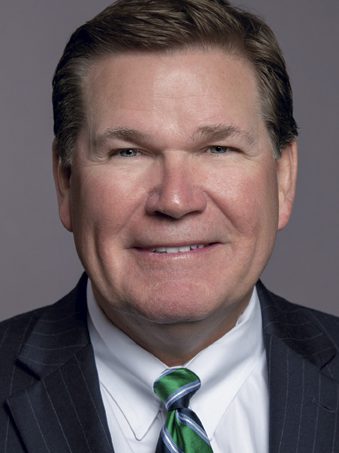YOUNG PROFESSIONALS
NO TIME FOR EXCUSES
Despite concerns and challenges regarding coronavirus, it’s time to move forward
By Christopher W. Cook
I liked the Stacked Pickle. Established in 2010, the sports bar owned and operated by former Indianapolis Colts player Gary Brackett soon became a franchise, with multiple locations predominantly in the Indianapolis area. It provided a great atmosphere to watch a sporting event with friends, grab a drink or a bite to eat with co-workers, or even host a low-key bachelor party—I went to two there, including my own.
In March, when restaurants began closing their indoor seating areas and switching to curbside pickup and delivery because of the coronavirus, the Stacked Pickle weighed its options and decided to temporarily close altogether, as pickup and delivery wasn’t a feasible option financially. Two months later, every location in the franchise closed its doors for good.
During these uncertain times of COVID-19, it is expected that you might to be worried. Some of your commercial clients may not make it through the pandemic; some already may have gone out of business, and this affects your business. But despite all the concerns, now is not the time for excuses or panic.
This past April, Nationwide conduct-ed a survey of 400 independent agents in the United States to discover their feelings and experiences regarding the COVID-19 pandemic and how it has affected their business. They were concerned, to say the least. Ninety percent reported that they were concern-ed with the amount of time it could take for the economy to recover, while 63% claimed that the economic impact during the pandemic will likely affect their ability to retire at the age they originally planned to.
With an ongoing global pandemic, some of these results were expected.
“There were some things that we expected and some things that were more challenging for some of our agents than they expected,” says Jeff Rommel, senior vice president of P-C sales and distribution for Nationwide. “I was proud of the response; agents are stepping up to assist their clients through the pandemic. They understand the role they play in placing clients first.”
When it comes to clients, “what we focused on in the beginning were the potential claims questions and identifying the best way for us to respond and communicate,” says Al Jannett, president of First State Insurance Agency, which has 19 offices across Missouri.
Regarding the survey results, “none of them surprised me,” he adds. “Answers and solutions are going to come as we innovate through this quagmire and shape the future of how we do business.”

—Jeff Rommel
Senior Vice President, P-C Sales and Distribution
Nationwide
Assistance
A key takeaway from the survey revolved around the challenge of maintaining one’s current portfolio (62%) and driving new business to the agency (69%). Eighty-five percent of the agents surveyed agreed with the statement, “I’m concerned some of my clients will go out of business because of the coronavirus.”
Instead of fretting and sweating the current situation, now is a good time for young agents to step up.
“This is a moment of truth for an agent,” says Rommel. “Clients are always asking ‘Why do I need an agent?’ These are the times when a young agent in particular can respond to this question and reinforce the value of an agent. It’s an opportunity to provide outstanding service, and to separate the agent who is committed to the client from the one who’s just collecting the premium.”
Education is key for agents to differentiate themselves from their competitors.
“To be a long-term, successful agent, you’re going to need knowledge, resources, and support,” says Jannett. “Younger folks will default to saving people money, and it doesn’t matter how much you save for a client if a claim is not covered. I push education with the young folks because that empowers them. They want to make a difference.”
This difference can be made by listening to and assisting clients. And clients will need assistance. According to the survey, 58% of respondents have had clients ask about suspending payments because of the coronavirus, 58% asked for advice on how they can cut costs, and 56% asked for help in understanding their coverage.
“Connect with your clients and listen to their needs,” says Rommel. “Once you hear what their needs are, bring forth solutions.
“Many carriers have provided hardship support in the form of a premium refund. Rather than just mailing the refund to the client, the agent should connect with the client and help them understand what they’re receiving and why they’re receiving it.
“Bring forward tools like telematics, where the client pays by the mile or pays based on driving experience. That’s a great way to help clients navigate through these unusual times,” Rommel asserts.
For agencies, connecting with their carriers is just as important as connecting with clients.
“We collected all of the communications from each of our carriers and distributed them to our staff,” says Jannett. “That way they know how we can soften the blow for a client who is out of work. It was important to our clients, and it reinforces why we should be part of their insurance decision-making and consulting.”
Another survey finding was that, because of concerns about the financial stability of smaller carriers, some agents were more inclined to use larger ones for their current needs.
“We have stronger resources from our larger carriers,” says Janett. “Typically, they have a stronger team of legal and compliance folks. I wouldn’t say that we are not inclined to use our smaller companies, but I think we’ve strengthened our value proposition with our larger carriers.”
“Trust is first and foremost, especially with young agents; their credibility is on the line,” adds Rommel. “They need a solid, strong, credible story to share with clients and must prove they can provide a carrier that has strong financial backing and is a brand that folks recognize.”
Going back to education, “You have to be a continual learner,” says Rommel. “I think the work from home environment has created opportunities where young professionals in particular can be focused on learning more about the industry and more about their clients and how to interact with them.”

—Al Jannett
President
First State Insurance Agency
New environments
As agents and brokers switched to a work-from-home environment, despite the change in surroundings, a majority felt they were still able to get the job done with the tools available to them. According to the survey, 83% indicated that they had the devices and technology needed to work from home and that they had appropriate channels in place to communicate effectively with their carriers, while 82% said they were able to provide clients the online self-service tools and resources they needed to manage their accounts.
“Agents and carrier employees have found that the way we used to do business isn’t the only way—we can be adaptable and we can adjust to a work-from-home model if we need to,” says Rommel. “We have to embrace more digital-based solutions. We found from our clients that they expect us to have these solutions; they expect us to provide tools that allow them to do more self service.
“Our ability to adjust to the new environment has been good for the industry as a whole. We found out that we’re not as limited as we thought we were, that we can service clients remotely,” Rommel remarks.
The survey uncovered a key area of concern: 60% of agents reported having challenges shifting their marketing to a digital-based approach.
“There are a lot of ways to differentiate yourself in this space,” Rommel says. “Social media is a prime area, whether it’s LinkedIn, Facebook, Twitter, Instagram, or whatever the right medium is for a given individual. This is the time to leverage these platforms. More folks are looking at them and consuming information through them.
“Young agents can become thought leaders through social media, and they don’t have to do it on their own,” he continues. “Agents need to align with carriers that can provide them the support they need to become a digital powerhouse. Agents have to reinvent themselves and take the opportunity in this new world to provide value through their social media, emails and website. Deliver what clients need in this environment versus what they needed before COVID-19.”
“If you’re going to differentiate yourself, you have to help your clients understand why they’re buying insurance,” says Jannett. “If they understand why they’re buying it, they’re going to take it more seriously and not focus on price. They’re going to focus on making sure they have the right coverage. If you spend $5,000 a year but you don’t have the right coverage, you’ve wasted your money.”
For anyone who is accustomed to an old-school way of doing things, digitally adapting one’s brand sounds difficult. There will be challenges and frustrations. COVID-19 has created frustrations for all of us, but now is not the time to make excuses.
“Early in the pandemic, I called a meeting of the sales team and said, ‘We cannot use this as an excuse to not be successful going forward,’” says Jannett. “We must look at how we’re going to be doing things differently. We need to embrace technology and adapt to the ways our clients will now want to do business.
“We were going down into a spiral where everybody was becoming negative and not wanting to adapt and adjust, which is why I called the meeting. In the first six months of the year, our profit was up 34%, and we’re on track for a phenomenal year. We have been affected, but the impact has been less because we resolved not to use the pandemic as an excuse for poor performance,” he adds.
Leaving the industry?
As a result of the COVID-19 pandemic, the Nationwide survey showed that 53% of agents have questioned their career choice as their portfolios shrink; this number was 62% among agents aged 18 to 39.
Despite the understandable fears of losing income and clients, the insurance industry is secure and stable.
“I haven’t seen an insurance agency or an insurance company close because of COVID-19,” says Jannett. “Insurance is not going away; it may take a few hits, but in general, jobs aren’t being lost in our industry.
“When a business closes, somebody else will lease the space and open another business when the economy starts to improve. There will be greater opportunities in the future.”
“Throughout the course of the pandemic, as businesses were closed and then reopened by the states, in almost every state, agencies and carriers were designated as essential businesses,” adds Rommel. “That’s indicative of how important insurance is to keep our economy rolling.
“New opportunities will arise; to capitalize on them, agents will need to add value. This isn’t an industry where you just put it in neutral; you actually have to work. If you’re willing to work, willing to understand your clients and deliver the solutions they need, I think there’s a ton of space for young people to enter this industry and do extremely well over the long term.
“Ours is a noble industry, and young professionals should be proud to be part of it,” Rommel continues. “This is a great place not only to have a job but to have a career. I encourage young folks to view the insurance industry as a long-term place to build that career.”
For more information:
First State Insurance Agency
www.fsiaonline.com
Nationwide
www.nationwide.com






